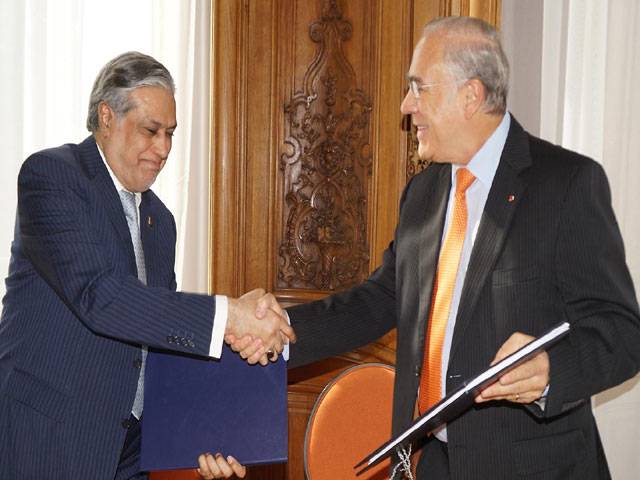ISLAMABAD - Pakistan has signed the OECD’s Multilateral Convention on Mutual Administrative Assistance in Tax Matters that would help in exchanging information about untaxed money of Pakistanis, amounting to billions of dollars, stashed in foreign banks.
Finance Minister Ishaq Dar signed the Convention along with Secretary General of the Organisation for Economic Cooperation and Development (OECD) Angel Gurria in Paris. The federal cabinet, on August 31 2016, had authorised the finance minister to sign the Convention.
The OECD’s invitation to Pakistan to sign the Convention became possible after over two years, during which peer reviews were conducted and amendments were introduced to Pakistan’s domestic income tax laws to meet requirements of the Organisation.
It demonstrates Pakistan’s strong commitment to adopt international best practices in the field of tax matters and join the multilateral fight against tax evasion through continuous and mutual exchange of information. The Convention, to which currently over 80 countries are signatory, would facilitate global cooperation to combat tax evasion.
“Through the Multilateral Convention, Pakistan shall be able to exchange information, including information on banking details, on reciprocal basis, with other partner countries, which is foreseeable, relevant for the administration or enforcement of its tax laws,” say the official documents.
“It is most comprehensive multilateral instrument available for all forms of tax cooperation to tackle tax evasion,” the documents added.
The Convention facilitates international cooperation for a better operation of national tax laws, while respecting the fundamental rights of taxpayers.
The convention provides for all possible forms of administrative cooperation between states in the assessment and collection of taxes, in particular with the view to combat tax avoidance and evasion. Pakistan and other OECD member countries would be facilitated in the following three ways.
Exchange of Information on Request: The requested state shall provide any information concerning particular persons or transactions to the requesting state, which is relevant for the administration or enforcement of tax laws.
Spontaneous Exchange of Information: The parties to the Convention shall, on a reciprocal basis, without prior request, forward to each other information about which there is a knowledge that there may be a loss of tax in the other country or would give rise to an increase in tax liability in that country.
Automatic Exchange of Information: The parties shall automatically exchange information that is relevant for administration or enforcement of their domestic tax laws.
As such, Pakistan will be receiving information annually in a few years time on the banking and other details of its nationals and tax residents from other countries signatory to the Convention.
Meanwhile, according to an official handout, the finance minister also held a bilateral meeting with the OECD secretary general to discuss ways and means to further strengthen the existing ties between Pakistan and the OECD.
He conveyed Pakistan’s desire to become OECD’s key partner country. He reaffirmed Pakistan’s determination to cooperate with the OECD in all important areas of mutual interest.
Dar informed the secretary general about the various economic and fiscal reforms undertaken by the government to stabilise Pakistan’s economy, and the increased budgetary support for health and education sectors. He also invited him to visit Pakistan. The secretary general congratulated the finance minister on historic signing of the Convention, and for playing a central role in bringing about economic turnaround in Pakistan.
He acknowledged that Pakistan had made great strides in economic field, which, he said, deserved accolades from international financial institutions.
He also invited Pakistan to various OECD global forums and meetings.
The OECD is an intergovernmental forum, which focuses on issues including trade, taxation, environment, technology and education.
It has 35 member countries in Europe, Americas and Asia Pacific. Pakistan, though not a member country, is regularly invited to its various committee meetings.






